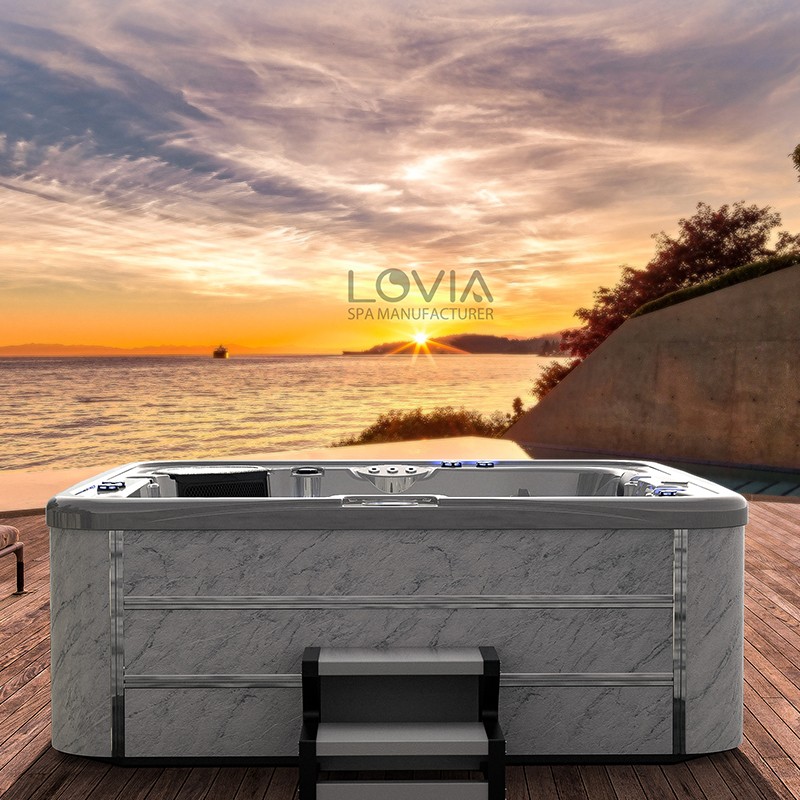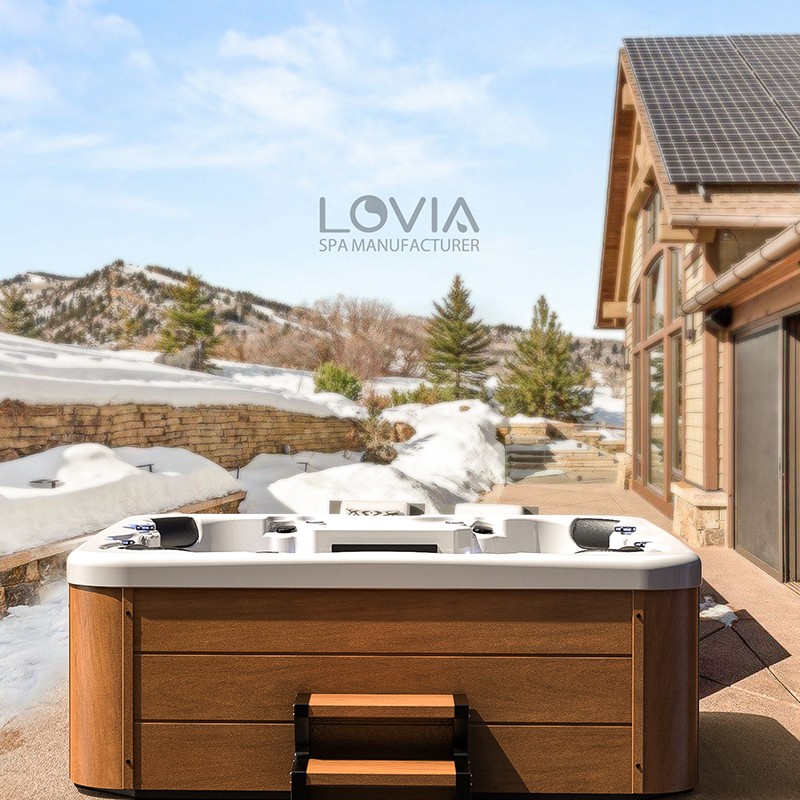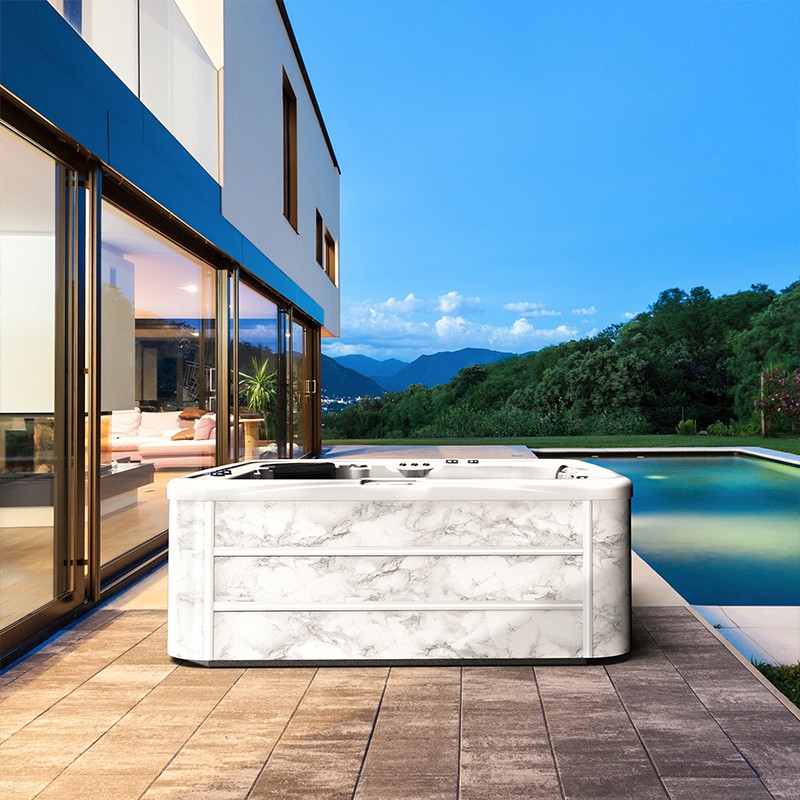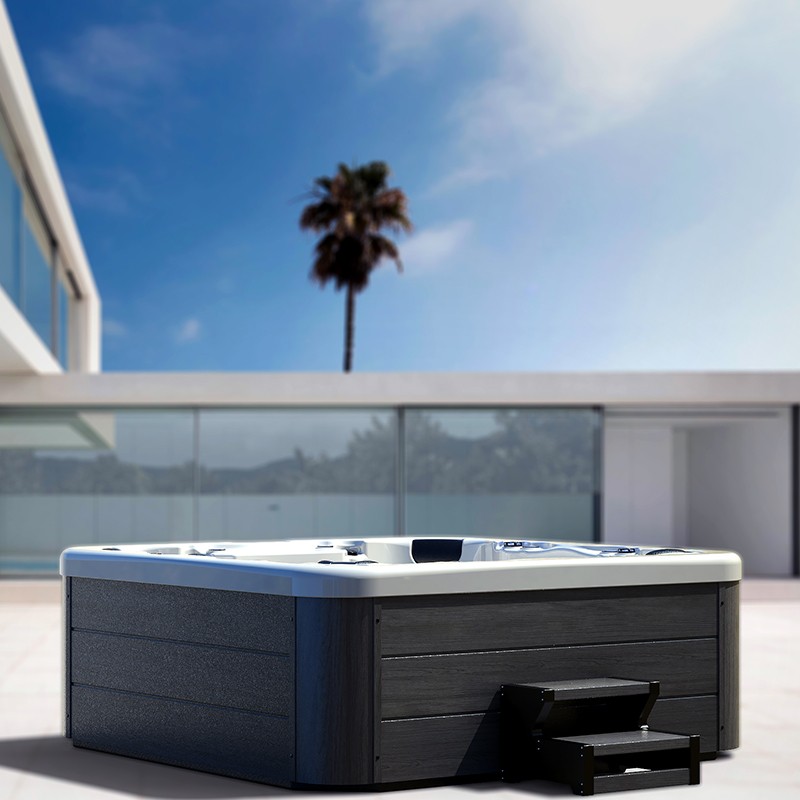
Er skummet i udendørs spabade skadeligt for udstyret?
2024-12-26 15:30Outdoor hot tubs are an ideal choice for many people to enjoy comfort and relaxation. Not only can it relieve muscle pain, but it can also provide a place for leisure and socializing. However, during the use of hot tubs, many users will find foam on the water surface. These foams not only affect the clarity of the water, but sometimes they can be disturbing.
So, is the generation of foam harmful to the equipment of hot bathtubs? How will the foam affect the normal operation of the tub? This article will analyze the foam problem in hot tubs from a scientific perspective to help users understand the causes, hazards and how to prevent and remove foam.

What are the causes of hot tub foam?
First of all, foam is not a normal phenomenon in hot bathtubs. The generation of foam is usually caused by the accumulation of chemicals or external pollutants in the water. Understanding the causes of foam helps us understand the possible impact of foam on equipment.
Accumulation of organic matter
One of the most common sources of foam is organic matter discharged by the human body. When entering a hot tub, the human body will carry various substances, such as skin oils, sweat, cosmetics, skin care products, sunscreen and perfume. These organic substances will enter the water and mix with other substances in the water, causing foam to form on the water surface.
Chemical imbalance
Maintaining the water in your hot water tub is very important, especially when the water temperature is high. Improper use of chemicals in the water (such as chlorine, pH balance adjusters, minerals, etc.) can cause an imbalance in the water quality. Too much chemicals can make the water dddhhhslipperydddhhh, which can cause foaming.
Water hardness and mineral content
Water hardness refers to the concentration of minerals such as calcium and magnesium in the water. If the water is too soft or the mineral content is unbalanced, foaming may occur easily on the surface of the water. In addition, excessive mineral accumulation can interfere with the effectiveness of chemicals, which can cause foaming problems.
Detergent and soap residue
If users do not rinse their bodies thoroughly before using the hot tub, residues from shower gels, soaps, shampoos, etc. can enter the water. Even small amounts of detergent residue can cause increased foaming in the hot water tub. These substances interact with the chemicals in the water, usually forming a lot of bubbles and foam.
Air mixed into the water
Many hot bathtubs are equipped with air jets to enhance the massage effect. If air jets or other air devices are not set up properly, too much air can be introduced into the water. This air combines with other substances in the water and can form foam.

What are the potential hazards of foam to equipment?
Although foam may seem harmless, in some cases it can have adverse effects on hot tub equipment. If not dealt with in time, the accumulation of foam may cause equipment performance degradation or even damage.
Clogged filtration system
Foam and the contaminants behind the foam may enter the hot bathtub's filtration system. The hot tub filter is responsible for removing impurities and particulates from the water. If the filtration system is clogged with foam and organic matter, the filtration efficiency will decrease, resulting in a continuous deterioration of water quality. Long-term accumulation of foam residue may also cause the filter to wear out prematurely or fail completely.
Clogged filtration system can also reduce water circulation efficiency and cause poor water flow. For some high-end hot tubs, the reduction in water flow may affect the operation of massage jets and heating systems, ultimately resulting in reduced equipment efficiency.
Heater and pump damage
Chemicals and contaminants in the foam may enter the hot bathtub's heater and pump system. The heater may corrode when handling unclean water, resulting in a shortened life of the equipment. Especially when the foam contains excessive amounts of chemicals or organic matter, the heater may accumulate scale or mineral deposits more quickly, which reduces heating efficiency.
As one of the most important parts of a hot tub, the pump is mainly responsible for driving the water flow and maintaining the massage effect. If there is too much foam and air, the pump may overwork, resulting in excessive pressure, which may damage the internal components of the pump. In addition, the chemicals in the foam accumulate in the pump, which may also cause chemical corrosion and shorten the service life of the pump.
Impact on the performance of the jet
The foam in the hot water tub will interfere with the water jet system. The jet usually produces a massage effect by mixing water and air. If there is too much foam in the water, the operation of the air jet and the water pump may be disturbed, affecting the jet effect. Excessive foam may also cause abnormal noise or pressure imbalance in the air jet, which will damage the overall performance of the jet system.
Difficult water quality maintenance
Foam not only affects the equipment, but also is a manifestation of water quality problems. The generation of foam means that there are more organic matter and chemicals in the water, and the water may no longer be clean. In this case, water quality maintenance becomes more complicated, and additional detergents or chemical treatments are usually required to restore the water balance.
Persistent foam problems will cause users to frequently adjust the chemical dosage, which increases the difficulty of water quality maintenance. Excessive use of chemicals may cause further corrosion to the equipment, resulting in increased maintenance costs.

How to prevent and deal with foam in hot tubs?
Since foam may cause a variety of adverse effects on equipment, preventing the generation of foam and dealing with foam problems in a timely manner is the key. Here are some effective ways to help users reduce the appearance of foam and protect hot tub equipment.
Regularly replace and clean filters
To prevent the filter system from being blocked, users should regularly check and replace the hot tub filter. Cleaning the filter can effectively remove impurities in the foam and keep the water flowing smoothly. Depending on the frequency of use, it is recommended to clean the filter every 2 to 4 weeks and replace the filter every few months.
Control the amount of chemicals used
Water quality maintenance of hot water tubs requires the correct use of chemicals, but excessive use of chemicals may cause foam problems. Therefore, users should add disinfectants and pH balancers in appropriate amounts according to the results of water quality tests to avoid excessive accumulation of chemicals. Regular water quality testing to ensure that the pH, alkalinity and disinfectant concentrations are within the appropriate range can effectively reduce the generation of foam.
Regular water changes
If the foam problem persists, it may be because the water quality has become too complex to be restored by chemical treatment. In this case, it is recommended that the user drain and clean the tub thoroughly and then refill it. Typically, changing the water in the hot tub every 3 to 4 months helps maintain clean water quality and prevent foam problems.
Use anti-foaming agents
Anti-foaming agents are chemical agents specifically designed to suppress foam in hot water tubs. It can prevent the formation and accumulation of bubbles by reducing the surface tension of water. Users can add an appropriate amount of anti-foaming agent when the foam just appears to prevent the foam from spreading. However, anti-foaming agents are only suitable for temporary solutions to foam problems and cannot fundamentally solve the problem of water quality imbalance.
Rinse the body thoroughly
To reduce the entry of organic matter, users should rinse their bodies thoroughly before using the hot bathtub to remove residual cosmetics, skin care products, perfumes and other chemicals. This can significantly reduce the generation of foam and help keep the water clean.

With over 30 years of experience in the spa and wellness industry, Lovia Spa has become a globally recognized name for premium swim spas, hot tubs, and outdoor wellness solutions. Our products, certified by CE, ETL, and ISO9001, are crafted to deliver luxury and comfort at affordable prices. Whether you’re a retailer, distributor, or resort owner, our factory offers tailored OEM and ODM services to suit your business needs. Explore our competitive wholesale prices and discover why we are among China’s top 5 spa brands. Contact us now for the latest promotional offers.
